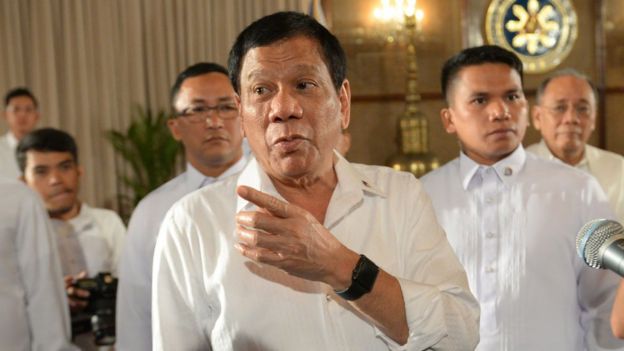Philippines top broadcaster ABS-CBN denied new licence
10 July 2020
 Image copyrightEPAImage captionABS-CBN went off-air on in early May
Image copyrightEPAImage captionABS-CBN went off-air on in early MayOne of the Philippines' largest broadcasters, ABS-CBN, has been refused a new licence after being forced off air in May.
On Friday, an overwhelming majority of a parliamentary committee rejected as "undeserving" ABS-CBN's request for a 25-year extension of its franchise.
Government critics say the refusal is directly connected to the channel's criticism of President Rodrigo Duterte.
ABS-CBN refused to broadcast Mr Duterte's campaign ads in 2016.
The broadcaster, which operates dozens of radio and TV stations, was first taken off air on 4 May its broadcast licence expired.
Ahead of the vote on its renewal application, pictures on social media showed supporters of the network outside Congress holding up posters proclaiming "Defend Press Freedom" and "Stop The Attacks".
"This is a black day for media freedom in a country previously regarded as a bastion of press freedom and democracy in the region," Phil Robertson, deputy Asia director of Human Rights Watch, said on Friday.
"Today's vote to deny the franchise renewal is an astounding display of obsequious behaviour by Congressional representatives, kowtowing to Duterte by agreeing to seriously limit media freedom in the Philippines," he said.
 Image copyrightGETTY IMAGESImage captionMr Duterte has repeatedly criticised ABS-CBN
Image copyrightGETTY IMAGESImage captionMr Duterte has repeatedly criticised ABS-CBNOpposition lawmakers say the suspension also undermines the fight against the coronavirus outbreak, which has infected more than 50,000 people in the country and killed more than 1,300.
ABS-CBN regularly reached more than 15 million homes on TV, radio and online. Founded in 1953, the media conglomerate employs some 11,000 people.
It can appeal against Friday's decision.
While freedom of the press is guaranteed under the constitution, the Philippines is one of the most dangerous places in the world for journalists, according to the US-based charity Freedom House.
And according to press freedom group Reporters Without Borders, "Private militias, often hired by local politicians, silence journalists with complete impunity".
Last month, Maria Ressa, the head of popular online news site Rappler, was found guilty of libel, in a case seen by many as an attempt to silence the site, which had been critical of the government.
The Philippines ranks 136th out of 180 countries on the World Press Freedom Index.
Although a commercial operation, ABS-CBN is very similar to the British Broadcasting Corporation. With more than 70 years of TV and radio history, it has shaped the Filipino psyche with entertainment and news programmes for all of the family.
But its critics say it represents the rich and powerful of the Philippines and, as an old, mainstream media offering, is out of touch with the will of social media users here.
Supporters of Philippine President Rodrigo Duterte say it is biased against him, but human rights groups say his supporters are missing the point - they say journalists are needed more than ever to keep Mr Duterte's power in check.
They point to the case of the news website Rappler. In 2018 alone, 11 legal cases were filed against the company in a move opposition groups say was a revenge attack by the president for critical coverage of his bloody drug war.
With television screens now blank where ABS-CBN's news programmes would otherwise be running, journalists are already calling 10 July 2020 a "black day" for freedom of speech in the Philippines.








